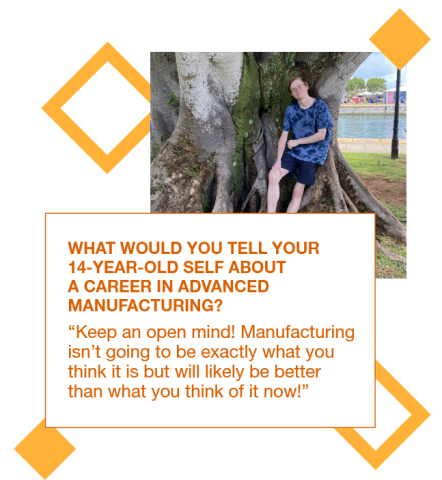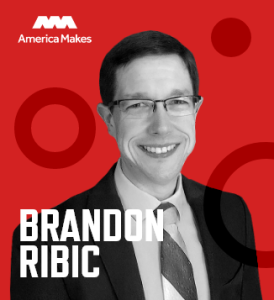
Trouble-Shooter, Skilled Technician, Student
At just 20 years old, Maddox Fooks is already making waves in advanced manufacturing. As a technician in the Tactical Communication Division at L3Harris, a major aerospace and defense technology corporation, he’s responsible for supporting the daily test and troubleshooting efforts of printed circuit boards and radios that are used in military applications. His role is hands-on, fast-paced, and mission-critical.
What makes Maddox stand out is not just his technical skill but his leadership. He helps delegate tasks across the team, ensures quality standards are met, and steps in to support testing when needed. From identifying defects to training others on automated and manual test procedures, Maddox plays a vital part in keeping operations running smoothly and efficiently. He’s also involved in creating process control documents to streamline workflows, proving that he’s not just doing the job; he’s improving it.
Maddox’s journey started at Finger Lakes Community College, a CESMII member in upstate New York, where he earned his Associate in Applied Science in Smart System Technologies. Even before finishing his second semester, he secured a full-time weekend position at L3Harris. Within just six weeks, he was performing at a level that usually takes half a year to reach. His dedication didn’t stop there—he earned a fast-track promotion to Tech-C, all while completing his degree and making the Dean’s List as a full-time bachelor’s student in Technology Management.
Maddox is proof that determination, curiosity, and a commitment to growth can fast-track a career in advanced manufacturing – this is what makes someone a Modern Maker.
Q&A with Maddox
How did you find your way to working in advanced manufacturing?
The A.A.S in Smart System technologies requires that a co-op with a technical business be completed as part of graduation. As part of this, the major does visits to local businesses in the Rochester area that fall within this description that are looking for potential Co-op opportunities with students. Through these business visits, and working with Sam Samanta, I found my way to L3Harris where I started working as a test technician, responsible for the accurate testing of radios and printed circuit boards (PCBs).


What is the most challenging part of your job?
I believe that the most challenging part of my job comes when things aren’t going how they should. This can happen for many reasons, such as a test station not working, a supplier quality issue, or perhaps a tester not hitting the target rate/yield on a particular product. Some of these items are outside of both my own, and my team’s control, but when it’s something that is preventable, I am responsible for providing somewhat negative feedback to people that may be underperforming. Negative feedback is still something that I am trying to improve at delivering but is currently the part of my job that I dislike the most.
What is the best part of your job?
I think that the best part of my job is seeing all the smaller parts of manufacturing come together to complete and ship one fully functional radio. Not many people stop to think how much work actually goes into manufacturing anything, whether it be computers, cars, or radios. We have multiple steps, from creating the PCB to testing it, to assembling it into a radio, to testing that radio, there are many different stops along the way to creating a working radio. Each stage in the process of manufacturing and testing a radio is integral to ensure we are shipping our customers quality parts and seeing everything work together to create one fully functional radio and knowing that I was a part of creating this radio is always a cool thing to see in my job.
What would people be surprised to learn about manufacturing or your role in manufacturing?
People might be surprised by how much precision and attention to detail goes into manufacturing military PCBs and radios. Every component has to meet strict reliability and durability standards because these systems operate in tough environments. We actually run some radios through environmental testing to ensure that they will work at specific temp extremes (-45 C, 60 C) Even seemingly small issues can cause mission critical points of failure that need to be addressed rapidly.
What advice do you have for someone new to the industry or considering manufacturing as a career?
Attention to detail and a willingness to learn will take you very far in a manufacturing role! Some of the best people that I work with don't have four-year degrees, some of them are just starting out with an associate’s, but they come into the workplace ready to learn anything, and that makes them an invaluable asset. The more open you can be to new ideas and concepts, the better!
What makes you excited to go to work on Mondays?
What excites me personally about going into work in the morning is being able to see work get completed. I am a very number-oriented person. I can easily wrap my head around numbers, whether it be important metrics, such as DPPM (Defective Parts Per Million), RTY (Roll-Throughput Yield), or just numbers such as 100 radios shipped in a day. Being able to look at the work that the company is getting done and know that I was a large part in helping complete it brings me a sense of pride and enjoyment in my day-to-day work life.
What are the three most important skills for your job?
Multitasking, adaptability, attention to detail
If you didn’t have to work, how would you spend your day?
Most days that I don't have work are spent working on schoolwork to some degree, as I am still pursuing a BBA in Technology Management from Alfred State College in New York. However, on the days that I don't have to do schoolwork, I typically will spend them hanging out with friends, and playing games online!
What activity gives you the most energy?

One personal activity that makes me energized is taking a walk. This activity relaxes me and is one that I’ve grown to enjoy as a stress reliever.
What hobbies make you better at your career?
I’ve always enjoyed disassembling old electronic devices, such as laptops and printers, to salvage and reuse circuit boards. I think this hobby really kick-started my fascination with electronics and ultimately led me to where I am today.
How does the work you do impact the world?
The work that I do impacts the world as the radios that I am helping to test and troubleshoot end up in the hands of soldiers around the world to be used for national defense. The radios that we produce go all over the world to help ensure the safety of both the radio operator in the military, and civilians back in the United States.




